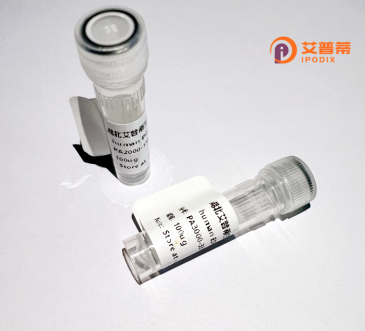
| 纯度 | >90%SDS-PAGE. |
| 种属 | Human |
| 靶点 | GALGT |
| Uniprot No | Q00973 |
| 内毒素 | < 0.01EU/μg |
| 表达宿主 | E.coli |
| 表达区间 | 1-328aa |
| 氨基酸序列 | MWLGRRALCALVLLLACASLGLLYASTRDAPGLRLPLAPWAPPQSPRRPELPDLAPEPRYAHIPVRIKEQVVGLLAWNNCSCESSGGGLPLPFQKQVRAIDLTKAFDPAELRAASATREQEFQAFLSRSQSPADQLLIAPANSPLQYPLQGVEVQPLRSILVPGLSLQAASGQEVYQVNLTASLGTWDVAGEVTGVTLTGEGQADLTLVSPGLDQLNRQLQLVTYSSRSYQTNTADTGARPGWRDGQAGQTEKNQKGWSGQMAEGMGGIWAMARAVQPHNGCFNWTSRARGRKGAFVHLGLEQARGKPEPWVCLPFRPTVGGPRKRLV |
| 分子量 | 61.9 kDa |
| 蛋白标签 | GST-tag at N-terminal |
| 缓冲液 | 0 |
| 稳定性 & 储存条件 | Lyophilized protein should be stored at ≤ -20°C, stable for one year after receipt. Reconstituted protein solution can be stored at 2-8°C for 2-7 days. Aliquots of reconstituted samples are stable at ≤ -20°C for 3 months. |
| 复溶 | Always centrifuge tubes before opening.Do not mix by vortex or pipetting. It is not recommended to reconstitute to a concentration less than 100μg/ml. Dissolve the lyophilized protein in distilled water. Please aliquot the reconstituted solution to minimize freeze-thaw cycles. |
以下是关于重组人GALGT蛋白的3篇参考文献及其摘要概括:
---
1. **文献名称**: *Overexpression of GALGT2 in dystrophic muscle rescues muscular dystrophy in a mouse model of Duchenne muscular dystrophy*
**作者**: Martin PT 等
**摘要**: 研究表明,通过基因治疗在小鼠模型(mdx)的骨骼肌中过表达GALGT2蛋白,可诱导细胞外基质的广泛糖基化修饰,从而减少肌肉病理特征并提高肌肉功能,为杜兴氏肌肉营养不良症提供了潜在治疗策略。
---
2. **文献名称**: *Enzymatic characterization and substrate specificity of recombinant human GALGT2 protein*
**作者**: Chiba A 等
**摘要**: 该研究利用重组人GALGT2蛋白进行体外酶学分析,揭示其特异性催化N-乙酰半乳糖胺(GalNAc)转移至α-肌营养不良聚糖(α-DG)的O-连接糖基化修饰,阐明了其在糖链合成中的关键作用机制。
---
3. **文献名称**: *GALGT2 gene therapy prevents dystrophic pathology in a canine model of Duchenne muscular dystrophy*
**作者**: Yoshida-Moriguchi T 等
**摘要**: 通过在大模型犬中应用GALGT2基因疗法,研究发现其能有效恢复α-DG的功能性糖基化,显著延缓肌肉退化和纤维化进程,验证了GALGT2在大型哺乳动物中的治疗潜力。
---
以上文献聚焦于GALGT2的生物学功能及治疗应用,覆盖基础酶学机制到临床前研究。如需扩展,可结合具体数据库(如PubMed)进一步查阅。
Recombinant human GALGT protein (rhGALGT) is a genetically engineered version of the native human β-1.4-N-acetylgalactosaminyltransferase, an enzyme critical in glycosylation processes. GALGT2. the gene encoding this protein, is part of the glycosyltransferase family and plays a role in synthesizing glycosaminoglycans (GAGs) and glycolipids. These glycoconjugates are essential for cell-cell communication, extracellular matrix organization, and neuronal development. Dysregulation of GALGT has been linked to muscular dystrophies, cancers, and neurodegenerative disorders.
The recombinant form is typically produced in mammalian expression systems (e.g., CHO or HEK293 cells) to ensure proper post-translational modifications, maintaining structural and functional fidelity. rhGALGT is widely used in research to study mechanisms of muscular dystrophy, particularly its ability to inhibit dystroglycanopathy by bypassing defective glycosylation pathways. Preclinical studies highlight its therapeutic potential in upregulating utrophin, a dystrophin homolog, to mitigate muscle degeneration.
Additionally, rhGALGT serves as a tool for exploring cancer biology, as altered glycosylation patterns are common in tumorigenesis. Its recombinant production enables scalable, pure protein supplies for biochemical assays, structural studies, and therapeutic development. Recent advances include viral vector-mediated delivery of GALGT in gene therapy trials for neuromuscular diseases, underscoring its translational relevance.
×